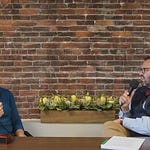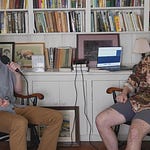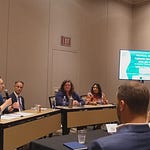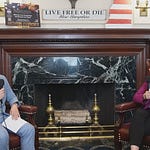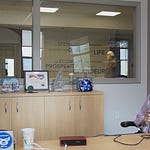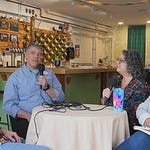This is Veronika.
She dresses like it’s 1955—and she’s doing it for the future.
A student, historian, and sustainability advocate, Veronika is rewriting what pageantry means in New Hampshire. As Miss Liberty 2025, she’s not just competing—she’s representing her roots, championing secondhand fashion, and showing young women that leadership comes in many forms (including vintage cardigans found for a dollar).
To Veronika, style is authenticity. Pageants are platforms. And optimism means taking action—even if it’s just helping someone see themselves in a crown for the first time.
Veronika Sokol is a passionate young changemaker bringing together multiculturalism, climate advocacy, and retro flair to inspire a new generation—one thrifted outfit at a time.
Links & notes:
This episode was recorded at the Hannah Grimes Center for Entrepreneurship in Keene, NH
Music provided by Sneaky Miles
Youtube
Episode Summary
How did you get into pageantry?
I actually started just last year. I’d always watched Miss America growing up and knew it was a scholarship program, but I didn’t know much beyond that. On a whim, I entered a local pageant and to my surprise, I won! That experience totally changed my life, and now I’m Miss Liberty 2025, preparing to compete for Miss New Hampshire.
What’s something people misunderstand about pageants?
A lot of people think it’s just about beauty or a few nights on stage, but it’s so much more. Since earning my title, I’ve done dozens of hours of community service, school visits, and advocacy work. It’s really about leadership, service, and empowering others—especially young girls—to find their voice.
What does the Miss America Opportunity mean to you?
It’s a platform that allows me to be fully myself while making an impact. The crown represents four points: style, success, service, and scholarship—and I’d add sisterhood as a fifth. It’s not just about appearances. It’s about being an authentic leader and using your voice for good.
How did vintage fashion become part of your identity?
I’ve always loved history, and about four years ago, I fell in love with vintage fashion—especially from the 1950s. I wear true vintage pieces every day, and I collect them too. It’s more than just a look for me; it’s a way to express myself and connect with the past.
What do you mean by “vintage style, not vintage values”?
It means embracing the beauty and craftsmanship of past fashion while rejecting outdated social norms. I love the sense of community and connection from earlier eras, but I’m also passionate about modern values like inclusivity, equity, and sustainability.
Why is sustainable fashion important to you?
I think one of the best things we can do for the planet is buy secondhand. There’s already enough clothing on Earth to clothe generations. I love hunting for well-made pieces at thrift stores or antique shops—it’s affordable, eco-friendly, and stylish. Plus, every piece has a story.
How has pageantry empowered you as a young woman?
It’s given me confidence, community, and a powerful platform. Being surrounded by intelligent, passionate women has pushed me to grow. It’s also shown me how to use my voice to make a difference—not just through what I wear, but in how I serve and lead.
What’s your community service focus?
I focus on sustainability and education. I visit schools and talk to kids about environmental issues, personal style, and following their passions. I want young people—especially in rural areas—to see that they matter and that they can create change.
Why do you want to be Miss New Hampshire?
It’s been a dream of mine for a long time. But more than that, I want to represent women who don’t often see themselves in that space. I’m Filipina and Czech, and I’d be the first Asian-American Miss New Hampshire—and only the second from Cheshire County since 1936. I want to show girls that they belong here, too.
What kind of questions do they ask in pageant interviews?
They can ask anything! From current events to community service to why I want to be Miss New Hampshire. I’ve done a lot of mock interviews to prepare, and they always keep me on my toes. It’s like a 10-minute conversation, but it can cover a ton of ground. I think my record is 21 questions in one interview!
Do you consider yourself an optimist?
Absolutely. I think optimism is essential—and active. Jane Goodall says hope is action, and I believe that. I don’t just hope things get better; I try to do something about it. That’s what drives me in everything I do.
Why do role models and representation matter to you?
Because I grew up in a predominantly white area, and I know what it feels like not to see yourself reflected. If I can be that role model for even one kid, it’s worth it. Representation isn’t just about race or ethnicity—it’s about showing others that someone like them can succeed.
What’s the biggest message you want people to take away from your story?
It doesn’t matter where you come from—what matters is what you do with your opportunities. I’ve been lucky in many ways, and I want to pay that forward. If I can use my platform to uplift others, then I’m doing what I’m meant to do.
*This episode summary was generated by an AI analyzing a transcript of the interview. The questions, wording, and written meaning of particular sections may contain slight differences to the original conversation. We include these summaries to give listeners a brief, readable synopsis of the episode. The full episode transcript is available on granitegoodness.com.






